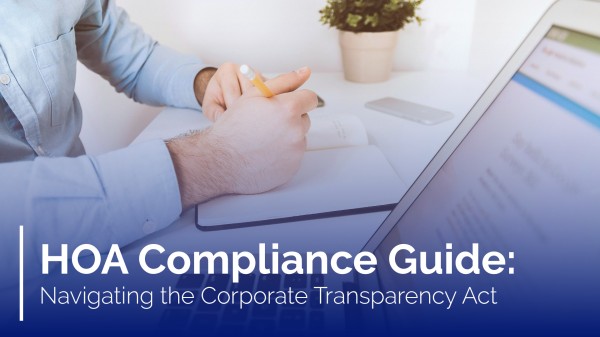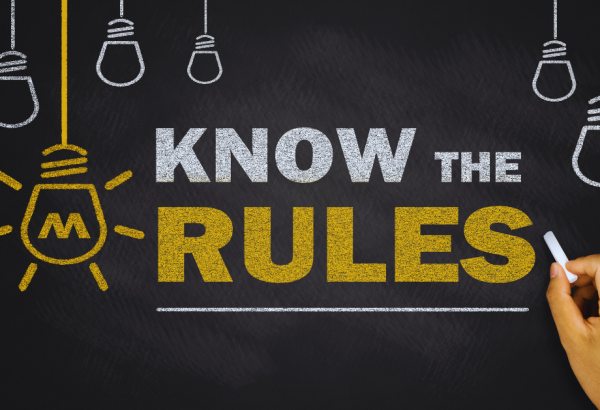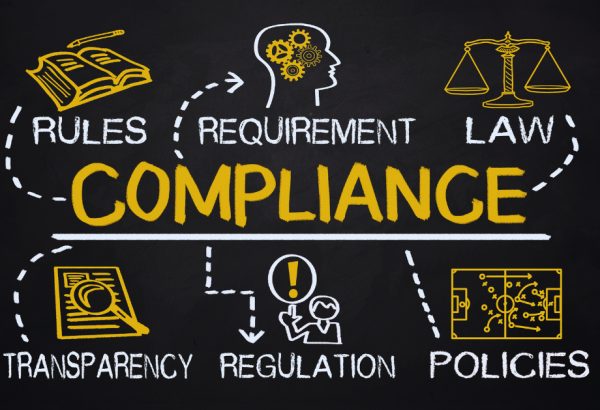HOA Compliance Guide: Navigating the Corporate Transparency Act
HOA Compliance Guide: Navigating the Corporate Transparency Act

As a member of your Homeowners Association’s (HOA) board, you’re responsible for more than just managing community concerns — you also have legal obligations to meet. One of the newest and most important regulations that could impact your association is the Corporate Transparency Act (CTA). Ignoring this act could lead to significant penalties, which makes understanding it essential for every HOA board.
The CTA was created to enhance transparency in business operations, and while it may have been aimed at large corporations, its provisions now extend to Homeowners Associations. This means your HOA could be subject to new reporting requirements, which, if overlooked, could lead to costly consequences.
Let’s take a closer look at the Corporate Transparency Act and how it applies to HOA management companies and the communities they serve. Understanding this law now can help you avoid potential penalties and keep your community’s operations running smoothly.
What is the Corporate Transparency Act (CTA)?
The Corporate Transparency Act was implemented as part of the Anti-Money Laundering Act of 2020, focusing on improving corporate transparency by requiring certain entities to disclose information about their beneficial owners. The main objective of the CTA is to prevent the misuse of corporate structures for illegal purposes like tax evasion and money laundering.
For HOAs, which manage shared property and funds for their communities, the CTA means certain transparency requirements must be met. Any HOA that qualifies as a "reporting company" under the CTA must disclose beneficial ownership information to FinCEN (Financial Crimes Enforcement Network).

CTA Rules That Matter Most for Your HOA
The Corporate Transparency Act includes specific rules which are relevant to Homeowners Associations (HOAs). Under the act, certain entities are required to report their beneficial ownership to the federal government. This is especially important for HOAs, as they are considered “reporting companies” if they meet specific criteria.
One key provision of the CTA is the requirement for HOA management companies and boards to identify and report beneficial owners, which could include board members or individuals with significant influence over the HOA’s finances. This step is crucial to ensure compliance with the act and avoid penalties.
Definition of Beneficial Owners
A beneficial owner is defined by the CTA as any individual who, directly or indirectly:
- Exercises substantial control over a reporting company, or
- Owns or controls at least 25% of the ownership interests of the entity.
In the context of HOAs, this could include individuals who own multiple units within a community or board members who have significant decision-making authority over the association’s assets. For example, an investor who owns more than 25% of the units in a condominium association would likely qualify as a beneficial owner and would need to be reported under the CTA.
Does the CTA Apply to Your HOA?
Determining whether the Corporate Transparency Act applies to your HOA depends on a few factors. HOAs are generally considered reporting companies if they meet certain criteria. For example, if your HOA is organized as a corporation, limited liability company (LLC), or similar entity, it is likely required to comply with the CTA.
However, not all HOAs will need to report under the CTA. Some smaller HOAs or those that do not have significant assets or beneficial owners may be exempt. It is important to assess your HOA’s structure and consult with legal professionals to determine whether compliance is mandatory.
Reporting Requirements and Deadlines
For HOAs that are subject to the Corporate Transparency Act, reporting requirements are clear. Beneficial Ownership Information (BOI) must be submitted to FinCEN, including details about each beneficial owner, such as their name, date of birth, address, and identifying numbers (such as a passport or driver’s license number).
The deadlines for submitting these reports vary depending on when the HOA was formed. New HOAs must report within 30 days of formation, while existing HOAs are typically required to submit their information by January 1, 2025. Failing to meet these deadlines can result in fines or other penalties.
Penalties for Noncompliance
Noncompliance with the CTA can lead to significant consequences for HOAs. Failing to file the required BOI reports or submitting false or incomplete information can result in civil penalties of up to $500 per day, as well as criminal fines of up to $10,000. In some cases, individuals may also face imprisonment for willfully failing to comply with the act.
Given the severity of these penalties, it is crucial for HOAs to ensure that they meet all reporting requirements and provide accurate information to FinCEN.

Compliance Checklist: How HOAs Can Prepare for the CTA
To ensure compliance with the CTA, HOAs should follow a structured approach. Here’s a step-by-step checklist to help your HOA stay compliant:
- Identify Beneficial Owners: Determine who qualifies as a beneficial owner within your HOA, focusing on individuals with substantial control or ownership.
- Gather Documentation: Collect the necessary personal information, such as names, addresses, and identification numbers, for all beneficial owners.
- Consult Legal Professionals: Work with legal advisors who specialize in HOA or community management law to ensure you are fully aware of your reporting obligations.
- Submit BOI Reports: File the required BOI reports with FinCEN by the appropriate deadlines.
- Stay Informed: Keep up to date with any changes to the CTA or related regulations that could impact your reporting requirements.
Utilizing Third-Party Services for Compliance
Many HOAs are turning to third-party services to simplify the process of managing their compliance with the Corporate Transparency Act. These services can help HOAs ensure they meet all reporting requirements, handle documentation, and file BOI reports on time.
Outsourcing compliance management can be an effective way to reduce the administrative burden on HOA boards, allowing them to focus on the day-to-day needs of their communities while ensuring they stay compliant with federal regulations.
Management Plus Can Help Your HOA Stay Compliant
The Corporate Transparency Act introduces new reporting requirements that many HOAs must comply with, including disclosing beneficial ownership information. These regulations may seem daunting, but staying informed and taking the right steps can ensure your community avoids penalties. From understanding key provisions like beneficial ownership and reporting deadlines to preparing your HOA for compliance, the CTA demands proactive action from every association.
Management Plus is here to help you navigate these complexities. With our extensive experience in managing the physical, financial, and administrative aspects of community associations, we provide the support you need to meet your compliance obligations while continuing to serve your community. Whether it’s helping you prepare reports, managing your finances, or offering expert consultation services, Management Plus ensures your HOA is in good hands. Learn more about how Management Plus can help you manage the physical, financial, and administrative aspects of your community association.
Reach out to Management Plus today!
Want more content from Management Plus to help your HOA stay compliant? Follow us on Facebook and LinkedIn for more!
Satisfied with the Management Plus difference? Leave us a quick review on Google!
